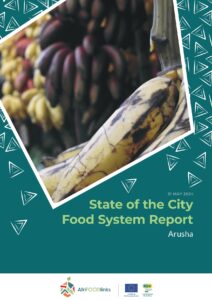

State of City Food System Report – Arusha
The report provides essential preliminary insights into Arusha’s food system. Highlighting the city’s history and evolution and shedding light into Arusha’s food diversity, various food system stakeholders, and the policy environment.
Summary
The report provides essential preliminary insights into Arusha’s food system and divided into two main sections: Introductory Information and Baseline Information. The Introductory Information covers the city’s history, including its evolution from a small center during German colonization to an international hub, and details its governance, economy, infrastructure, food security, and cultural ties to its food system. The Baseline Information highlights Arusha’s food system stakeholders, policy environment, and the city’s food diversity. It identifies key players from the private sector, NGOs, government, and research institutions. While nutrition is prioritized nationally, local implementation remains challenging. Arusha faces rapid population growth, strained infrastructure, and a dominant informal economy due to limited formal employment opportunities. Despite these challenges, Arusha’s food resilience is bolstered by robust transportation networks, though issues like unhealthy food handling practices and affordability of nutritious food persist. The report underscores the importance of affordable, nutritious food and calls for strengthening value chains and promoting awareness through targeted campaigns. The Arusha Sustainable Food Systems Platform (ASFSP) emerges as a crucial initiative for addressing these challenges and advancing integrated food policy actions.

